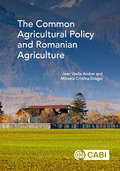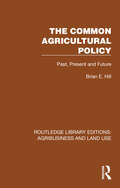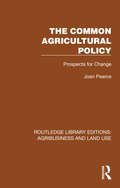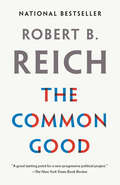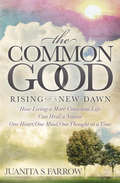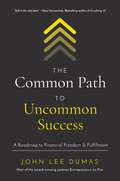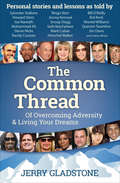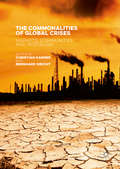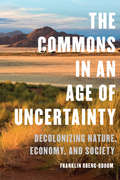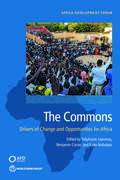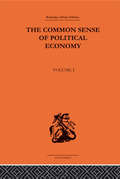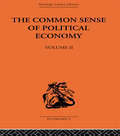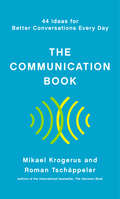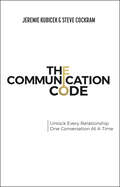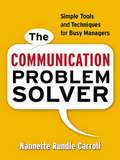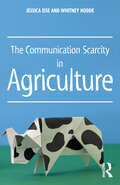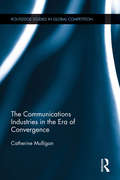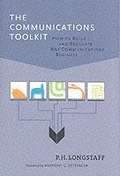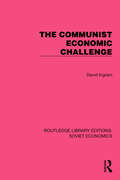- Table View
- List View
The Common Agricultural Policy after the Fischler Reform: National Implementations, Impact Assessment and the Agenda for Future Reforms
by Alessandro Sorrentino Roberto HenkeProviding an updated state of the art report on the effects of the 2003 Common Agricultural Policy (CAP) reform, this volume has a particular emphasis on the governance of institutional changes and national/regional implementation. Written from an agricultural economist's point of view and enriched by the contribution of political scientists and policy makers, this book offers: - an updated report of the European debate on agricultural and rural policies; -an in-depth analysis of the decoupling process of the agricultural financial support in Europe; - an analysis of the CAP implementation in the old and new Europe Member States ; - a discussion on the future scenarios for the European Agricultural Policies Based on a selection of papers from the 109th Seminar of the European Association of the Agricultural Economists (EAAE), this book, with a foreword by Franz Fischler, also includes four commissioned contributions from leaders in the field including Sofia Davidova, Roberto Esposti, Tassos Haniotis and Johan Swinnen.
The Common Agricultural Policy and Romanian Agriculture
by Jean Vasile Andrei Mihaela Cristina DragoiThe current evolution of the European economy suggests that in the near future, research in agri-food economy and agri-food production, and agricultural production systems and structures must be redesigned, adapted and developed to respond to the lack of sustainability of agri-food production systems and the current global food crisis. This book analyses the agricultural paradigm transformations that occur as countries converge on the European agricultural model and what their impact is for sectoral development, while emphasizing their contribution to the redefinition of rural agricultural communities and economy. This book helps develop a theoretical framework by analysing the specialized empirical literature and techniques used in the field of agricultural economy research, with a focus on the transformation of Romanian agriculture in order to become integrated and respond to the globalization of markets. presents, analyses and discusses the main theories in field of agricultural economics and paradigms; creates a working paradigm for this concept within agricultural economics; provides a theoretical framework for the agricultural model. The book is aimed at students and researchers in agricultural economics, and government and policy makers internationally.
The Common Agricultural Policy: Past, Present and Future (Routledge Library Editions: Agribusiness and Land Use #14)
by Brian E. HillOriginally published in 1984, this book provides an introduction to the history of agriculture in Western Europe, states the case for government intervention and analyses the operation of the Common Agricultural Policy (CAP) during the late 20th Century. It concludes that the costs of the policy fell heavily on the poorer consumers, food prices were artificially high and surpluses sold at a loss on the world markets. In the light of Britain’s departure from the EU and the EU CAP this book, which also examined the prospects for the future has an enduring relevance.
The Common Agricultural Policy: Prospects for Change (Routledge Library Editions: Agribusiness and Land Use #20)
by Joan PearceOriginally published in 1981, at a time when the EEC’s Common Agricultural Policy had remained largely unchanged, this book examines the criticisms of the CAP and analyses the pressures emanating from the budget and the various options which were available for tackling them. It then outlines the approaches that individual member states and others were likely to adopt, and assesses whether the need for action on the budget will be used as an opportunity to revise the CAP.
The Common Good
by Robert B. ReichFrom the best-selling author of Saving Capitalism and The Work of Nations, a passionate, clear-eyed manifesto on why we must restore the idea of the common good to the center of our economics and politics.With the warmth and lucidity that have made him one of our most important public voices, Robert B. Reich makes the case for a generous, inclusive understanding of the American project, centering on the moral obligations of citizenship. Rooting his argument in everyday reality and common sense, Reich demonstrates the existence of a common good, and argues that it is this that defines a society or a nation. Societies and nations undergo virtuous cycles that reinforce and build the common good, as well as vicious cycles that undermine it. Over the course of the past five decades, Reich contends, America has been in a slowly accelerating vicious cycle--one that can and must be reversed. But first we need to weigh what really matters, and how we as a country should relate to honor, shame, patriotism, truth, and the meaning of leadership.Powerful, urgent, and utterly vital, this is a heartfelt missive from one of our foremost political thinkers: a fundamental statement about the purpose of society and a cri de coeur to save America's soul.
The Common Good: Rising of a New Dawn: How Living a More Conscious Life Can Heal a Nation One Heart, One Mind, One Thought at a Time
by Juanita S. FarrowAn inspiring guide about how our daily decisions can turn hate and fear into hope and love. The Common Good: Rising of a New Dawn will forever change how you see your neighbor. On this captivating spiritual journey through America, hear the stories of how ordinary people—people in the trenches devoted to the common good—are making an extraordinary difference in the lives of many. With passion, wit, and wisdom, Juanita Farrow discusses business, politics, and religion, and paints a compelling picture of how the common good is God&’s desire for America, and why it&’s good for America. Juanita Farrow states, &“We live in a great country, but far too often we allow our beliefs and egos to divide us in ways that become a form of paralysis that impacts the entire nation.&” Explore how the people in our lives and the experiences of our journey begin to shape our decisions and our view of the world. The Common Good speaks to people of faith and nonbelievers, and challenges everyone to look within for authentic purpose. It looks at pressing issues for Americans, but also the rising of a new dawn. Building the bridges to transcend differences will require a lot of heart. Creating a movement for the common good will be difficult, but even businesses, for instance, have found social entrepreneurship not only solves problems around the world, but is good for the bottom line. The Common Good describes how living a more conscious life can heal a nation—one heart, one mind, one thought at a time. A message of hope on how to turn fear into love, it can leave you feeling truly empowered—and inspired to make a difference.
The Common Law
by Oliver Wendell Holmes Jr.Oliver Wendell Holmes, Jr. (1841-1935) is generally considered one of the two greatest justices of the United States Supreme Court, Chief Justice John Marshall being the other. In more than 2000 opinions, he delineated an impressive legal philosophy that profoundly influenced American jurisprudence, particularly in the area of civil liberties and judicial restraint. At the same time, his abilities as a prose stylist earned him a position among the literary elite.In The Common Law, derived from a series of lectures delivered at the Lowell Institute in Boston, Holmes systematized his early legal doctrines. The result was an enduring classic of legal philosophy that continues to be read and consulted over a century later. Beginning with historical forms of liability (thought to have originated in the desire for vengeance in ancient Roman and Germanic blood feuds), the book goes on to discuss criminal law, torts, bails, possession and ownership, contracts, successions, and many other aspects of civil and criminal law.Encompassing Holmes's profound, wide-ranging knowledge of the law in its historical aspects, yet written in a manner easily accessible to the layman, The Common Law provoked this observation from another famed jurist; "The book is a classic in the sense that its stock of ideas has been absorbed and become part of common juristic thought ... they placed law in a perspective which legal scholarship ever since has merely confirmed." -- Felix Frankfurter, Of Law and Men.Now the influential ideas and judicial theory of Oliver Wendell Holmes, Jr. can be studied and appreciated in this superb edition -- the only one in print -- of his magnum opus. This edition also features a new introduction by Professor Sheldon M. Novick, author of Honorable Justice: The Life of Oliver Wendell Holmes. First published in 1881, this book is still indispensable reading for lawyers, political scientists, historians, general readers -- anyone interested in the origins, development, and continuing evolution of the laws that govern human society.
The Common Path to Uncommon Success: A Roadmap to Financial Freedom and Fulfillment
by John Lee DumasSay hello to YOUR version of uncommon success with a revolutionary 17-step roadmap to guide your journey to financial, location, and lifestyle freedom!Based on thousands of interviews from John Lee Dumas&’ highly acclaimed podcast, Entrepreneurs on Fire, this revolutionary 17-step roadmap provides a proven path for entrepreneurs like you to achieve the financial, location, and lifestyle freedom you are capable of. Let The Common Path to Uncommon Success show you how.The Common Path to Uncommon Success will:Reveal the critical steps successful entrepreneurs take to achieve uncommon success.Dispel the doubts and fear you&’re currently facing while providing a clear path to financial freedom and fulfillment.Ensure you avoid the pitfalls that have tripped up countless entrepreneurs.Provide a &“Well of Knowledge&” section for you to tap into anytime you're in need of inspiration or motivation!JLD&’s 17-step roadmap will help you accomplish your #1 goal in life, as it has for so many others, by showing you how to properly focus on your vision of success until it becomes your reality.
The Common Thread: Of Overcoming Adversity & Living Your Dreams
by Jerry GladstonePersonal stories from entertainers, athletes, and other successful people on how they overcame setbacks—and advice on how you can, too. What makes the difference between the desire for success and real success? Learn from some of the world&’s most successful people—including Mark Cuban, Sylvester Stallone, Bill O&’Reilly, Montel Williams, Stevie Nicks, Snoop Dogg, Gloria Gaynor, Randy Couture and others, in this unique collection of stories and advice. They may be Academy or Grammy award winners, Super Bowl or World Series champions, Rock and Roll Hall of Fame legends, best-selling authors, or even billionaires—but that doesn&’t mean they have never faced obstacles and challenges. In fact, it was their ability to overcome the inevitable hardships of life that kept them on the path to achievement. Here, you can learn about their experiences and discover the &“common thread&” that successful people share. Stop letting your circumstances, your lack of resources, or your past define who you are or what you can become. Find proven strategies, insights, wisdom and perspective—in a guide that helps you master new skills and habits with practical, helpful &“do it daily&” tips you can implement immediately. &“With his winning attitude and the many stories Jerry has shared in his book, there is no doubt we can all benefit and be empowered to reach our fullest potential&” —Jim Davis, Emmy award-winner and creator of Garfield
The Commonalities of Global Crises
by Christian Karner Bernhard WeichtBringing together contributions from an international group of social scientists, this collection examines diverse crises, both historical and contemporary, which implicate market forces, widening inequalities, social exclusion, forms of resistance, and ideological polarisation. The Commonalities of Global Crises offers carefully researched case studies which stretch across large geographical distances- from Egypt to the US and from northern, central, eastern and southern Europe to South America- and covers timely issues including human rights, slavery, care, migration, racism, and the far right. The volume demonstrates that such different settings and diverse concerns are characterized by a common tension in which the crises that unfold around pressures of widening marketization and commodification are met by the (re)building or re-assertion of various communities, and competing politics of solidarity and nostalgia.
The Commons in an Age of Uncertainty: Decolonizing Nature, Economy, and Society
by Franklin Obeng-OdoomIn the last two hundred years, the earth has increasingly become the private property of a few classes, races, transnational corporations, and nations. Repeated claims about the "tragedy of the commons" and the "crisis of capitalism" have done little to explain this concentration of land, encourage solution-building to solve resource depletion, or address our current socio-ecological crisis. The Commons in an Age of Uncertainty presents a new explanation, vision, and action plan based on the idea of commoning the land. The book argues that by commoning the land, rather than privatising it, we can develop the foundation for prosperity without destructive growth and address both local and global challenges. Making the land the most fundamental priority of all commons does not only give hope, it also opens the doors to a new world in which economy, environment, and society are decolonised and liberated.
The Commons: Drivers of Change and Opportunities for Africa (Africa Development Forum)
by Stéphanie Leyronas, Benjamin Coriat, and Kako Nubukpo'The Commons' explores the many forms of development being championed by Africa's residents, users, and citizens. In addition to managing property and shared tangible and intangible resources collectively, communities are experimenting with a concept of 'commoning' founded on values such as community, engagement, reciprocity, and trust. In practice, their approach takes the form of land-based commons, housing cooperatives, hybrid cultural spaces or places for innovation, and collaborative digital platforms. The purpose of this book, where observation of historical and recent practices converges with new theories within commons scholarship, is not to promote commons themselves. Rather, it examines the tensions, drivers of change, and opportunities that surround commons dynamics in Africa. This book highlights the abundance of commons-based entrepreneurial processes in Sub-Saharan Africa and shows that partnerships between African public authorities and communities involved in the commons can be powerful drivers of sustainable development for the continent.
The Commonsense of Political Economy: Volume One (Routledge Library Editions)
by Philip H. WicksteedFirst Published in 2003. Routledge is an imprint of Taylor & Francis, an informa company.
The Commonsense of Political Economy: Volume Two (Routledge Library Editions)
by Philip H. WicksteedThis is Volume XXI of twenty-three in a collection on the History of Economic Thought. Originally published in 1933, this volume offers selected papers and reviews on economic theory as a second volume of two.
The Communication Book: 44 Ideas For Better Conversations Every Day
by Roman Tschäppeler Mikael KrogerusMikael Krogerus and Roman Tschäppeler have tested the 44 most important communication theories and distilled them in book form, alongside clear and entertaining illustrations. Want better conversations? Ask open-ended questions that have no right or wrong answers—make your partner feel brilliant. Want better meetings? Ban smartphones, use a timer, and make everyone stand up. Want better business deals? Focus on the thing, rather than the person; on similarities, rather than differences; and on good outcomes, rather than perfect ones. Whether you want to present ideas more clearly, improve your small talk, or master the art of introspection, The Communication Book delivers, fusing theoretical knowledge and practical advice in a small but mighty package. With sections on work, the self, relationships and language, this book is indispensable for anyone who wants to improve what they say, and how they say it.
The Communication Code: Unlocking Every Relationship, One Conversation at a Time
by Jeremie Kubicek Steve CockramProvides a proven series of skills and techniques that anyone can use to make their relationships thrive Healthy communication is essential in any professional or personal relationship. When the lines of communication are frayed or broken, the resulting drama, unnecessary conflict, and inefficiency often lead to 'dropping the ball'. Better communication yields better results. It's a no-brainer—honest conversations build deeper, more productive relationships. It may seem simple in theory, but healthy communication is one of the most challenging things to master in practice. The Communication Code helps you set up conversations and communication in a way that creates a win-win scenario for everyone involved. In this real-world guide, bestselling authors and international speakers Jeremie Kubicek and Steve Cockram share their simple but powerful strategies for boosting your emotional intelligence and elevating your interpersonal communication skills. Step by step, you will learn to integrate Care, Celebration, Collaboration, Critique, and Clarification into your communication toolbox. Using one of these 5 Cs, you can verbally ask someone to respond in the way that you most want, and as a result, facilitate a successful interaction. Written by the team that brought you The 100X Leader, The 5 Voices, and The 5 Gears, this must-have book will help you: Connect and communicate effectively with your team, your family, and your friends Define the parameters of a conversation from the outset to avoid any misunderstandings Understand the power dynamics of an interaction to eliminate the fear of honest conversation Offer constructive criticism without offending or disappointing the person on the other side Maximize your situational awareness and collaborate like a pro Prevent communication attacks and restore healthy communication flow The Communication Code: Unlock Every Relationship, One Conversation at a Time offers a practical, easy-to-implement solution for decreasing or eliminating miscommunication. It is essential reading for anyone wanting to improve the health of their relationships through clear and authentic communication.
The Communication Problem Solver: Simple Tools and Techniques for Busy Managers
by Nannette Rundle CarrollMore business problems center on issues of communication than is commonly believed. Frequently, managers deal with outward manifestations of problems while the real underlying communication issues remain unchanged. This book offers practical guidance, complete with real-world examples, for managers who want to address root causes of problems. How to form better relationships, how to provide more effective input and feedback, how to use communications skills to be a better leader, and how to create a better work environment are all covered in this book. Annotation c2010 Book News, Inc. , Portland, OR (booknews. com)
The Communication Scarcity in Agriculture
by Jessica Eise Whitney HoddeToday, the general public craves information on food and agriculture with an unprecedented passion. But the agricultural sector, unaccustomed to an interested and inquisitive society, has largely failed to respond to the public’s demands for information. Instead, corporations, time-pressed journalists, bloggers, media celebrities, film-makers, authors and concerned consumers jumped in to fill the void. Food is emotional, and these players - some well-intentioned and others not - got a lot of traction playing off consumer fears of the unknown. This critical and timely book explains how changing demographics, cultural shifts, technological advances and agriculture’s silence all combined to create the perfect storm – a great chasm between those who know, and those who don’t know, agriculture. The ramifications of a poorly-informed consumer base are now becoming clear in our policy debates and consumer-driven business decisions. There is a lot of common ground between the agricultural sector and their consumer base, but each group largely fails to appreciate it, and the consequences of such a divide grow increasingly dire. Drawing on a wide-range of expertise, from leading agricultural researchers to major agribusiness leaders to consumer advocates, Eise and Hodde lay out exactly why communication is so urgently critical to our modern-day agricultural system. They outline the major themes affecting agricultural communication – perception, emotion, technology, science - and what we can do now to improve the debate and safeguard our future food supply for generations to come.This book is suitable for those who study agriculture, environmental economics and mass media and communication.
The Communications Consultant’s Foundation: Leveraging Public Relations Expertise for Personal and Client Success
by Roger DarnellFor all professionals and students who want to improve their prospects in business, this book prepares and positions them to build dream careers, giving them the education and guidance required to develop vital soft skills, and work remotely and independently. After establishing a foundation for solid professional communications on a personal level, it quickly opens doors to business insights and opportunities that are exciting, inspiring, and highly sustainable. Immersing readers into the key realms of business success and exploring the full spectrum of essential communications practices, they gain knowledge and trade skills of immense value, including: • The basics of positive, proactive, strategic communications for individuals and organizations • What it means to be a PR expert in the creative industry and to do great work • An introduction to essential business imperatives, with high-level instruction on creativity, strategy, leadership, management, marketing, and much more • Customer service and all it entails • Extensive exploration of the PR toolset and its application in real-world marketing scenarios This book brings home all instruction with sophisticated questions and challenges, ensuring readers have every opportunity to comprehend and grow, step by step.
The Communications Consultant’s Master Plan: Leveraging Public Relations Expertise for Client and Personal Success
by Roger DarnellThis volume builds on Roger Darnell’s The Communications Consultant’s Foundation by providing insider knowledge gained over the past three decades atop the field of communications consulting, incorporating lessons learned serving businesses in the global creative industry. Going beyond the basics of a communications consulting business, this book parses and distills the knowledge of top business management luminaries, helping readers build and expand their expertise to heighten their opportunities, and maximize all aspects and phases of their businesses, from start-up through to succession. It discusses essential topics including: • The business of running a PR agency, with emphasis on landing clients and honing expertise to remain exceptional • Advanced PR practices including investor relations and strategic planning • Agency expansion, addressing growth and exit strategies Working PR professionals, entrepreneurs, students, and recent graduates will appreciate high-level insights from a seasoned business owner, as well as templates for proposals, campaign planning, and more. Read with The Communications Consultant’s Foundation or on its own, this book will lead readers on life-changing journeys and help a new generation of smart communicators take their professional pursuits to the highest levels.
The Communications Industries in the Era of Convergence (Routledge Studies In Global Competition Ser. #54)
by Catherine E. MulliganThis book provides a unique view of the evolution of these industries, drawing out how technology and economic forces have worked together to create platforms around which different companies interact. Through identifying the key aspects of this evolution over the past decades, the author is able to put forward a unique view of the emerging industrial structure of the communications industries – the formation of an Information-Driven Global Commodity Chain, one that holds both incredible promise and challenges for our world.
The Communications Toolkit: How to Build and Regulate Any Communications Business
by P. H. Longstaff Anthony OettingerThis book provides the tools necessary to build lasting, flexible strategies to survive and grow in these times of transition. Whether you are a business executive, lawmaker, policy analyst, industrialist, stock analyst, lawyer, or judge, these tools will help you to solve real problems right away.
The Communicative Engineer: How to Ask, Listen, Write, Speak, and Use Visuals
by Stuart G. WaleshTHE COMMUNICATIVE ENGINEER Application-oriented communication guidebook designed for engineering students and practitioners to improve their asking, listening, writing, speaking, and use of visuals Practicing engineers spend about half their time communicating ideas, facts, and feelings but invest only a small part of their formal education learning how to communicate. The Communicative Engineer addresses this gap. When used as a textbook for students or resource for practitioners, this book shows engineers in all disciplines how to use five communication modes—asking, listening, writing, speaking, and visuals—to participate in or lead successful engineering projects and achieve professional success and significance. Written by a highly qualified author with six decades of relevant experience, The Communicative Engineer: Illustrates, using examples, the benefits of communication knowledge, skills, and attitudes (KSA) and the costs of poor communicationPresents communication fundamentals and goes well beyond theory by illustrating numerous applicationsDescribes the five modes of communication, including their pros and cons, and offers detailed advice on when and how to use themPrepares readers to use or participate in various communication forms such as interviews, letters, meeting minutes, memoranda, oral examinations, proposals, question and answer sessions, reports, resumes, speeches, and texts Profiles excellent engineer communicators to serve as exemplars and references memorable speeches from within and outside of engineering to provide examplesProvides thorough documentation of content for readers who want to dig deeper into selective aspects of communication Supplementing the scientific and technical education of engineers, The Communicative Engineer offers engineering students and practitioners in all disciplines the parallel communication KSA needed to fully realize their potential. Given technology’s ever-increasing role in society, the communicative engineer will be prepared to fill leadership roles.
The Communist Economic Challenge (Routledge Library Editions: Soviet Economics #2)
by David IngramThe Communist Economic Challenge (1965) examines the substantial industrial development in the Soviet Union, and its European satellites, and China, looking at Khrushchev’s boast that by 1970 the USSR’s industrial output would surpass that of the USA. The book analyses the communist record, and evaluates the reality of the Soviet claims that its growth was a mark of the ‘inherent superiority’ of its economic system over capitalism.
The Communist Manifesto
by Friedrich Engels Karl MarxThe Communist Manifesto presents the argument that capitalism is by its very nature exploitative and hence is antithetical to freedom. Written in 1848, it became the blueprint for the communist wave that would sweep Europe. It remains a fascinating read.

